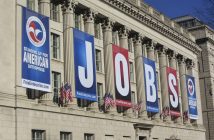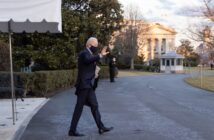During the 2016 presidential campaign, Donald Trump pledged: “I will end the use of the H-1B [foreign workers]as a cheap labor program forever, and institute an absolute requirement to hire American workers first for every visa and immigration program. No exceptions.”
Four years on, federal, state and local government agencies have some 18,000 foreign nationals working for them.
Most of the hires are made through international staffing companies, many based in India, to fill positions that could otherwise go to U.S. workers.
An analysis of Department of Labor (DOL) data found that more than 2,000 H-1B visa holders were placed in contracted federal government jobs during the first nine months of fiscal year 2019.
The number is a tiny fraction of the estimated 4 million workers on federal contracts, but the continued use of H1-B workers flies in the face of Trump’s directive to “Hire American.”
Fannie Mae and Freddie Mac, under the Federal Housing Finance Agency, accounted for 1,340 of the H-1B hires. Also on the list were the Health and Human Services Department (290 H-1B workers) and the DOL itself (40). Last month, FAIR reported that the Tennessee Valley Authority, a federally owned corporation, was aggressively outsourcing jobs through H-1B and other foreign-labor programs.
The vast majority of the government’s H1-B contingent is in information technology occupations such as software developers, computer programmers and systems analysts. Trump’s directive notwithstanding, federal law exempts non-profits — including government agencies — from the annual cap of 85,000 new foreign workers imported through H-1B visas.
Trafficking in visa workers turns a tidy profit for staffing companies, which take large commissions for each H-1B hire. Breitbart described the process:
“Company A may win a contract to deliver 100 H-1Bs to a government agency. Company A then rents the 100 H-1Bs from subcontractors B, C, and D. But those subcontractors can rent H-1Bs from each other before renting them to Company A. This hidden back-scratching process would allow the companies’ executives to take three bites from each workers’ salary — and also to hire lobbyists to protect the lucrative H-1B process.”
Not surprisingly, there have been problems. Several staffing companies (known in the trade as body shops) have been implicated in visa fraud schemes, with others accused of discriminating against American workers.
Public-sector use of H-1B labor may conform with all the legal requirements, but is it right? Hardly, says a Washington, D.C., group that advocates for work-visa reforms.
“The people we’re talking about here are doing routine IT jobs,” Roger Ross, a policy adviser for U.S. Tech Workers, told FAIR this week. “There is no shortage of qualified American workers for these positions, but H-1B workers are essentially indentured, and they’re paid less. They’re not the best and brightest.”
That’s your government at work.





1 Comment
Pingback: Government Contractors Keep Hiring Foreign Workers – India Inc Blog